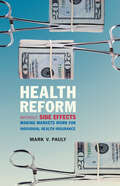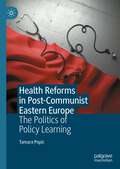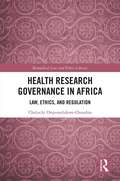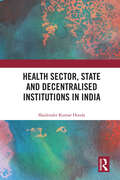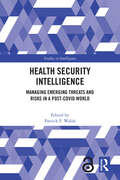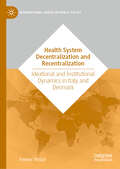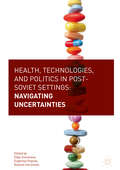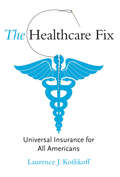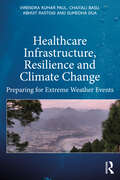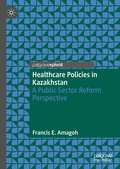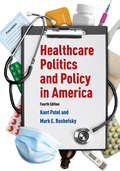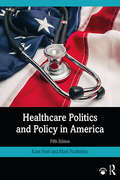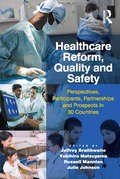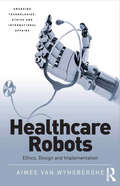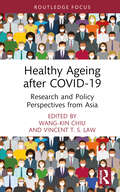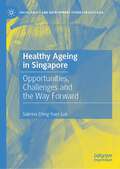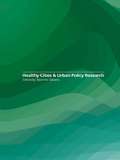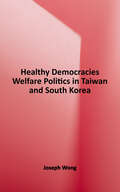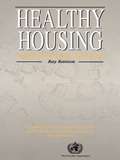- Table View
- List View
Health, Politics, and Revolution in Cuba Since 1898
by Katherine HirschfeldChallenging many of the assumptions scholars have made about the Cuban Revolution's impact on healthcare, this volume recounts one anthropologist's quest to discover the truth behind the complicated relationship between Cuba's revolution, politics, and healthcare system. Katherine Hirschfeld became interested in Cuba in the mid-1990s, after reading numerous laudatory books and articles describing the Castro regime's achievements in health and medicine. Cuba's population health indicators seemed to be far superior to those of neighboring countries, the national health costs low, and medical care free at point-of-service to the entire people. Historical records indicated that most of these positive health trends resulted from the changes instituted by Castro in 1959. Few of these authors, however, had actually spent time on the island. Thus, Hirschfeld found that academic writing on Cuba was often long on praise, but short on empirical research about what exactly had changed in Cuban medicine since 1959.After much bureaucratic wrangling, Hirschfeld managed to secure permission to conduct long-term ethnographic research in Cuba, where she lived with families from Havana and Santiago, conducted clinic observations, interviewed doctors and patients, and was treated in a Cuban hospital during an epidemic of dengue fever. The reality of the Cuban healthcare system turned out to be different than the scholarly ideal: it was bureaucratized, authoritarian, and repressive, and most people preferred to seek healthcare in the informal economy rather than endure the material shortages, red tape, and political surveillance of the public sector. Written in the form of a first-person narrative, Health, Politics, and Revolution in Cuba Since 1898 not only critically reevaluates Cuban healthcare after the 1959 revolution; it includes chapters detailing Cuban health trends from the Spanish-American War (1898) through the fall of Fulgencio Batista in 1959 and into the
Health Reform without Side Effects: Making Markets Work for Individual Health Insurance
by Mark V. PaulyMark V. Pauly offers a detailed look at the individual insurance market in the United States. He explains how it works, suggests approaches to improvement that build on what currently works well, and provides a realistic assessment of how much improvement we can demand and expect. He concludes that, although there are some serious deficiencies in today's individual insurance market, there are also some important advantages in this market that should be preserved.
Health Reforms in Post-Communist Eastern Europe: The Politics of Policy Learning
by Tamara PopicThis book provides the first in-depth study of healthcare reforms in post-communist Eastern Europe. Combining insights from comparative politics and public policy analysis, it examines health reforms in Slovenia, the Czech Republic, and Poland between 1989 and 2019. The book argues that the post-communist transformation of healthcare policy has entailed a process of policy learning, and that the countries' reform pathways were shaped by a series of initiatives aimed at applying market-oriented policy ideas in healthcare. The success of these initiatives has been influenced by three factors: policy legacies, political competition, and institutional configurations. The book offers a novel comparison of health reform in the region and policy changes more generally. It will appeal to scholars and students of public policy, health policy, and European politics.
Health Research Governance in Africa: Law, Ethics, and Regulation (Biomedical Law and Ethics Library)
by Cheluchi Onyemelukwe-OnuobiaThe globalisation of research has resulted in the increased location of research involving humans in developing countries. Countries in Africa, along with China and India, have seen research grow significantly. With emerging infectious diseases, such as Ebola and Zika, emphasising the risk of public health crises throughout the world, a further increase in health research, including clinical research in developing countries, which are often the sites of these diseases, becomes inevitable. This growth raises questions about domestic regulation and the governance of health research. This book presents a comprehensive and systemic view of the regulation of research involving humans in African countries. It employs case studies from four countries in which research activities continue to rise, and which have taken steps to regulate health research activity: South Africa, Nigeria, Kenya, and Egypt. The book examines the historical and political contexts of these governance efforts. It describes the research context, some of the research taking place, and the current challenges. It also looks at the governance mechanisms, ranging from domestic ethical guidelines to legal frameworks, the strengthening of existing regulatory agencies to the role of professional regulatory bodies. The book analyses the adequacy of current governance arrangements within African countries, and puts forward recommendations to improve the emerging governance systems for health research in African and other developing countries. It book will be a valuable resource for academics, researchers, practitioners and policy-makers working in the areas of health research, biomedical ethics, health law and regulation in developing countries.
Health, Risk and Vulnerability
by Alan Petersen Iain WilkinsonThe concept of risk is one of the most suggestive terms for evoking the cultural character of our times and for defining the purpose of social research. Risk attitudes and behaviours are understood to comprise the dominant experience of culture, politics and society in our times. Health, Risk and Vulnerability investigates the personal and political dimensions of health risk that structure everyday thought and action. In this innovative book, international contributors reflect upon the meaning and significance of risk across a broad range of social and institutional contexts, exploring current issues such as: the ‘escalation of the medicalization of life’, involving the pathologization of normality and blurring of the divide between clinical and preventive medicine the tendency for mental health service users to be regarded as representing a risk to others rather than being ‘at risk’ and vulnerable themselves the development of health care systems to identify risk and prevent harm women’s reactions to ‘high risk’ screening results during pregnancy and how they communicate with other women about risk men and the use the internet to reconstruct their social and sexual identities Charting new terrain in the sociology of health and risk, and focusing on the connections between them, Health, Risk and Vulnerability offers new perspectives on an important field of contemporary debate and provides an invaluable resource for students, teachers, researchers, and policy makers.
Health Sector, State and Decentralised Institutions in India
by Shailender Kumar HoodaThis book describes the transition in Indian healthcare system since independence and contributes to the ongoing debate within development and institutional economics on the approaches towards reform in the public health system. The institutional reform perspective focuses on examining the effective utilisation of allotted resources and improvements in delivery through decentralisation in governance by ensuring higher participation of elected governments and local communities in politics, policymaking and delivery of health services. It discusses the economic (resource) reforms to explain the relevance and expansion of state interventionism along with its influence on the health sector, accountability and allocative efficiency. The author also explores the connections between neoliberal thought and privatisation in health sector, and examines the greater role of insurance-based financing and their implications for health service access and delivery. The book offers ways to address long-standing systemic and structural problems that confront the Indian healthcare system. Based on large-scale surveys and diverse empirical data on the Indian economy, this book will be of great interest to researchers, students and teachers of health economics, governance and institutional economics, political economy, sociology, public policy, regional studies and development studies. This will be useful to policymakers, health economists, social scientists, public health experts and professionals, and government and nongovernment institutions.
Health Security Intelligence: Managing Emerging Threats and Risks in a Post-Covid World (Studies in Intelligence)
by Patrick F WalshThe book takes a multi-disciplinary approach to explore the role national security intelligence agencies played in supporting national governments’ response to COVID-19.Spanning the ‘Five Eyes’ intelligence countries (UK, USA, Canada, Australia and New Zealand), this book offers the first cross-comparative analysis of what intelligence agencies need to focus on in responding more effectively to future emerging health and biological security threats risks and hazards post-COVID-19. The volume addresses three principal issues. First, it investigates what roles the Five Eyes intelligence communities played (along with other key stakeholders, such as public health agencies) in managing the COVID-19 pandemic. Second, it assesses the challenges of and lessons learnt from these intelligence communities’ engagement in managing aspects of the pandemic. Third, it explores how the Five Eyes might play more effective roles in managing future health security threats and risks, whether those are intentional (bioterrorism and bio crimes), accidental (laboratory releases) or unintentional (pandemics) in origin. Overall, this book offers a coherent and holistic research agenda that seeks to improve understanding about the role of national security intelligence in managing health security threats and risks post-COVID-19.This book will be of much interest to students of intelligence studies, health security, public health and International Relations.The Open Access version of this book, available at http://www.taylorfrancis.com, has been made available under a Creative Commons Attribution-Non Commercial-No Derivatives (CC-BY-NC-ND) 4.0 license.
Health System Decentralization and Recentralization (International Series On Public Policy)
by Andrea TerlizziThis book explores the dynamics of health system decentralization and recentralization, investigating why and how the territorial organization of health systems changes or remains stable over time. Drawing from historical and discursive institutionalism, the explanatory framework revolves around the role of ideas, discourse and institutions. Through the analysis of the Italian and Danish health systems, the book corroborates the value of combining ideational and institutional accounts in explaining institutional continuity and change, offering new empirical and theoretical insights into the study of public policy making. The book will be of use to students and scholars interested in health politics and policy, federalism and decentralization, and theories of institutional change.
Health Systems in Transition
by Gregory MarchildonThe health care system in Canada is much-discussed in the international sphere, but often overlooked when it comes to its highly decentralized administration and regulation. Health Systems in Transition: Canada provides an objective description and analysis of the public, private, and mixed components that make up health care in Canada today including the federal, provincial, intergovernmental and regional dynamics within the public system. Gregory P. Marchildon's study offers a statistical and visual description of the many facets of Canadian health care financing, administration, and service delivery, along with relevant comparisons to five other countries' systems.This second edition includes a major update on health data and institutions, a new appendix of federal laws concerning select provincial and territorial Medicare legislation, and, for the first time, a comprehensive and searchable index. It also provides a more complete assessment of the Canadian health system based on financial protection, efficiency, equity, user experience, quality of care, and health outcomes.Balancing careful assessment, summary, and illustration, Health Systems in Transition: Canada is a thorough and illuminating look at one of the nation's most complex public policies and associated institutions.
Health, Technologies, and Politics in Post-Soviet Settings
by Olga Zvonareva Evgeniya Popova Klasien HorstmanThis book uses a variety of empirical cases on topics including drug development, egg donation, and governance of healthcare facilities, to investigate how actors navigate the uncertainties that permeate the interfaces of health, technologies, and politics in post-Soviet settings and what the implications of their chosen navigation routes are. Contemporary societies are imbued with uncertainties, but the authors focus on settings where uncertainties multiply, making decisions, practises, and relations in everyday life precarious. Two worlds are brought into dialogue throughout the chapters of this book with the aim of facilitating mutual learning from one another - the world of science and technology studies (STS) and the high-income liberal democracies of the West, on one hand, and studies of post-socialism on the other. In so doing, this book encourages critical learning on ensuring the resilience of individual and societal health in situations of profound uncertainties. This timely collection will be of great interest to scholars, practitioners and policy makes in the fields of sociology, biomedicine, political science and public and global health.
The Healthcare Fix: Universal Insurance for All Americans
by Laurence J. KotlikoffKotlikoff proposes a simple, straightforward approach to the problem that would create one system that works for everyone and secure America's fiscal and economic future. His proposed Medical Security System is not the socialized medicine so feared by Republicans and libertarians.
The Healthcare Fix: Universal Insurance for All Americans (The\mit Press Ser.)
by Laurence J. KotlikoffA simple, straightforward, and foolproof proposal for universal health insurance from a noted economist.The shocking statistic is that forty-seven million Americans have no health insurance. When uninsured Americans go to the emergency room for treatment, however, they do receive care, and a bill. Many hospitals now require uninsured patients to put their treatment on a credit card which can saddle a low-income household with unpayably high balances that can lead to personal bankruptcy. Why don't these people just buy health insurance? Because the cost of coverage that doesn't come through an employer is more than many low- and middle-income households make in a year. Meanwhile, rising healthcare costs for employees are driving many businesses under. As for government-supplied health care, ever higher costs and added benefits (for example, Part D, Medicare's new prescription drug coverage) make both Medicare and Medicaid impossible to sustain fiscally; benefits grow faster than the national per-capita income. It's obvious the system is broken. What can we do?In The Healthcare Fix, economist Laurence Kotlikoff proposes a simple, straightforward approach to the problem that would create one system that works for everyone and secure America's fiscal and economic future. Kotlikoff's proposed Medical Security System is not the "socialized medicine" so feared by Republicans and libertarians; it's a plan for universal health insurance. Because everyone would be insured, it's also a plan for universal healthcare. Participants—including all who are currently uninsured, all Medicaid and Medicare recipients, and all with private or employer-supplied insurance—would receive annual vouchers for health insurance, the amount of which would be based on their current medical condition. Insurance companies would willingly accept people with health problems because their vouchers would be higher. And the government could control costs by establishing the values of the vouchers so that benefit growth no longer outstrips growth of the nation's per capita income. It's a "single-payer" plan, but a single payer for insurance. The American healthcare industry would remain competitive, innovative, strong, and private.Kotlikoff's plan is strong medicine for America's healthcare crisis, but brilliant in its simplicity. Its provisions can fit on a postcard and Kotlikoff provides one, ready to be copied and mailed to your representative in Congress.
Healthcare, Guaranteed: A Simple, Secure Solution For America
by Ezekiel EmmanuelAmerica spends more than any other developed nation on healthcare-$2. 1 trillion in 2007 alone. But 47 million Americans remain uninsured, and of those Americans who are insured, many suffer from poor health. In his ground-breaking proposal, Dr. Ezekiel Emanuel offers up a plan to comprehensively restructure the delivery and quality of our healthcare. By eliminating employer-healthcare and establishing an independent program to evaluate healthcare plans and insurance companies, he offers a no-nonsense guide to how government can institute private insurance options that will allow each of us a choice of doctor and plan. With the rate of healthcare costs rapidly outpacing our gross domestic product, we can no longer afford to maintain our fragmented delivery of care, or entertain reforms that seek to patch, rather than cure, a fractured system. Accessible, straightforward, and revolutionary in its approach, Healthcare, Guaranteed is an inarguable guide to lasting healthcare reform.
Healthcare Infrastructure, Resilience and Climate Change: Preparing for Extreme Weather Events
by Virendra Kumar Paul Abhijit Rastogi Sumedha Dua Chaitali BasuThis book highlights the vulnerability of healthcare buildings in the context of climate change-triggered extreme weather events (EWEs) and the case for mitigation. With a concise discussion on climate change and its consequences in the form of such events, a cost model and equations that register losses and help quantify them are then presented. The model can be used to estimate the significant potential loss that might occur during an EWE and help healthcare facilities prepare for them. The book analyses cases of major EWEs in India over the last two decades and collates the data available into various categories. Through this research the authors have developed a framework which assists healthcare facilities with a detailed calculation of value losses, both tangible and intangible. The framework can be used to assess the impacts on healthcare buildings in terms of disruption of services so that appropriate decisions related to the resilience in healthcare planning can be taken into consideration. Thus, the book is useful for directing planning and design processes aimed at continuity of service and building resilience to perform in the face of natural disaster and extreme weather. The purpose of this book is to prompt facilities planners and healthcare facilities to prepare to respond to EWEs through the planning and design process in a rational manner. Built infrastructure professionals such as architects and engineers, policy makers, and academics with an interest in disasters, risk and climate change will all find this book to be key reading.
Healthcare Policies in Kazakhstan: A Public Sector Reform Perspective
by Francis E. AmagohThis book is the first of its kind about healthcare reform efforts in Kazakhstan since its independence within the context of the public sector reform movement. The book provides a brief background of Kazakhstan and its Soviet legacy and the country’s efforts to modernize the health system, before creating an overview of the existing system, the reforms since independence, and the future of healthcare in Kazakhstan. This book will be of interest to policymakers, analysts, and development economists.
Healthcare Politics and Policy in America: 2014
by Kant Patel Mark E RushefskyThis book provides a comprehensive examination of the ways that health policy has been shaped by the political, socioeconomic, and ideological environment of the United States. The roles played by public and private, institutional and individual actors in designing the healthcare system are identified at all levels. The book addresses the key problems of healthcare cost, access, and quality through analyses of Medicare, Medicaid, the Veterans Health Administration, and other programs, and the ethical and cost implications of advances in healthcare technology. This fully updated fourth edition gives expanded attention to the fiscal and financial impact of high healthcare costs and the struggle for healthcare reform, culminating in the passage of the Affordable Care Act, with preliminary discussion of implementation issues associated with the Affordable Care Act as well as attempts to defund and repeal it. Each chapter concludes with discussion questions and a comprehensive reference list. Helpful appendices provide a guide to websites and a chronology. PowerPoint slides and other instructional materials are available to instructors who adopt the book.
Healthcare Politics and Policy in America
by Kant Patel Mark E RushefskyHealth policy in the United States has been shaped by the political, socioeconomic, and ideological environment, with important roles played by public and private actors, as well as institutional and individual entities, in designing the contemporary American healthcare system. Now in a fully updated fifth edition, this book gives expanded attention to pressing issues for our policymakers including the aging American population, physician shortages, gene therapy, specialty drugs, and the opioid crisis. A new chapter has been added on the Trump administration's failed attempts at repealing and replacing the Affordable Care Act and subsequent attempts at undermining it via executive orders. . Authors Patel and Rushefsky address the key problems of healthcare cost, access, and quality through analyses of Medicare, Medicaid, the Veterans Health Administration, and other programs, and the ethical and cost implications of advances in healthcare technology. Each chapter concludes with discussion questions and a comprehensive reference list. This textbook will be required reading for courses on health and healthcare policy, as well as all those interested in the ways in which American healthcare has evolved over time.
Healthcare Reform, Quality and Safety: Perspectives, Participants, Partnerships and Prospects in 30 Countries
by Jeffrey Braithwaite Yukihiro Matsuyama Julie JohnsonThis book offers a global perspective on healthcare reform and its relationship with efforts to improve quality and safety. It looks at the ways reforms have developed in 30 countries, and specifically the impact national reform initiatives have had on the quality and safety of care. It explores how reforms drive quality and safety improvement, and equally how they act to negate such goals. Every country included in this book is involved in a reform and improvement process, but each takes place in a particular social, cultural, economic and developmental context, leading to differing emphases and varied progress. Methods for tackling common problems - financing, efficiencies, effectiveness, evidence-based practice, institutional reforms, quality improvement, and patient safety initiatives - also differ. Representatives from each nation provide a chapter to convey their own situation. The editors draw a conclusion from these numerous contributions and synthesize the themes emerging into a coherent ’lessons learned’ summary that delivers value to the numerous stakeholders. Healthcare Reform, Quality and Safety forms a compendium of the current ’state of the art’ in global healthcare reform. This is the first book of its type, and offers a unique opportunity for cross-fertilization of ideas to the mutual benefit of countries involved in the project. The content will be of interest to governments, policymakers, managers and leaders, clinicians, teaching academics, researchers and students.
Healthcare Robots: Ethics, Design and Implementation (Emerging Technologies, Ethics and International Affairs)
by Aimee van WynsbergheThis study deals with an underexplored area of the emerging technologies debate: robotics in the healthcare setting. The author explores the role of care and develops a value-sensitive ethical framework for the eventual employment of care robots. Highlighting the range of positive and negative aspects associated with the initiative to design and use care robots, it draws out essential content as a guide to future design both reinforcing this study’s contemporary relevance, and giving weight to its prescriptions. The book speaks to, and is meant to be read by, a range of disciplines from science and engineering to philosophers and ethicists.
Healthy Ageing after COVID-19: Research and Policy Perspectives from Asia (ISSN)
by Wang-Kin Chiu and Vincent T. S. LawWritten by researchers and experienced health professionals from Hong Kong, China, Chiu and Law identify and examine important issues of healthy ageing after COVID-19 from research and policy perspectives in the Asian contexts.This book opens with discussions of healthy ageing from personal, social, economic, and political perspectives. These discussions make reference to the key characteristics of a community health model. It aims to examine the impacts of the COVID-19 pandemic on aged care in an international perspective, citing the fifth wave of COVID-19 in Hong Kong as a case report. Comprehensive analysis on the influence of COVID-19 infection on Hong Kong and the implemented anti-pandemic policy measures, as well as recommendations of post-pandemic policies to promote healthy ageing, are provided. This monograph also reviews the worldwide impacts on aged care during and after the pandemic, as well as the experience of aged care services in Hong Kong and other Asia-Pacific regions. The responding changes in policies and strategies for healthy ageing in selected countries are also reviewed. This monograph ends with a highlight on the design and development of a community model for healthy ageing, providing insights to the achievement of sustainable healthy ageing with reference to the sustainable development goal (SDG) 3.A valuable resource to governments, politicians, academics, and practitioners, it is intended for formulating future directions of relevant research, and the design and implementation of interventions for the promotion of healthy ageing in the post-pandemic era.
Healthy Ageing in Singapore: Opportunities, Challenges and the Way Forward (Social Policy and Development Studies in East Asia)
by Sabrina Ching Yuen LukSingapore is the world’s second-fastest ageing society and will become a super- aged society by 2030. This book fills an important research gap by examining Singapore’s efforts to achieve healthy ageing. It draws on both semi-structured interviews and secondary data (e.g. government documents, journal articles, books, reports) to examine hot topics such as financial wellness of older adults, ageing in place, dementia friendly communities and digital connection with older adults in the time of the 2019 coronavirus disease (COVID-19). In the interviews, experts and professionals provide valuable insights into the issue of healthy ageing in Singapore. The book ’s goal is to provide a comprehensive portrait of healthy ageing in Singapore, while also sharing valuable lessons to help other countries achieve healthy ageing.
Healthy Aging in Asia
by Karen EgglestonLife expectancy in Japan, South Korea, and much of urban China has now outpaced that of the United States and other high-income countries. With this triumph of longevity, however, comes a rise in the burden of noncommunicable diseases (NCDs) like diabetes and hypertension, reducing healthy life years for individuals in these aging populations, as well as challenging the healthcare systems they rely on for appropriate care. The challenges and disparities are even more pressing in low- and middle-income economies, such as rural China and India. Moreover, the COVID-19 pandemic has underscored the vulnerability to newly emerging pathogens of older adults suffering from NCDs, and the importance of building long-term, resilient health systems. What strategies have been tried to prevent NCDs—the primary cause of morbidity and mortality — as well as to screen for early detection, raise the quality of care, improve medication adherence, reduce unnecessary hospitalizations and increase "value for money" in health spending? Fourteen concise chapters cover multiple aspects of policy initiatives for healthy aging and economic research on chronic disease control in diverse health systems — from cities such as Singapore and Hong Kong to large economies such as Japan, India, and China.
Healthy Cities and Urban Policy Research
by Takehito TakanoHealthy Cites and Urban Policy Research is a collection of papers by leading experts from academia or international organisations who have been involved in the Healthy Cities Movement. It is the first academic work to combine public health with urban planning. Contemporary issues from various perspectives are included which address evaluation, evidence-based practice, accountability, community participation and information technology.
Healthy Democracies: Welfare Politics in Taiwan and South Korea
by Joseph WongDo the pressures of economic globalization undermine the welfare state? Contrary to the expectations of many analysts, Taiwan and South Korea have embarked on a new trajectory, toward a strengthened welfare state and universal inclusion. In Healthy Democracies, Joseph Wong offers a political explanation for health care reform in these two countries. He focuses specifically on the ways in which democratic change in Taiwan and South Korea altered the incentives and ultimately the decisions of policymakers and social policy activists in contemporary health care debates. Wong uses extensive field research and interviews to explore both similarities and subtle differences in the processes of political change and healthcare reform in Taiwan and South Korea. During the period of authoritarian rule, he argues, state leaders in both places could politically afford to pursue selective social policies--reform was piecemeal and health care policy outcomes far from universal. Wong finds that the introduction of democratic reform changed the political logic of social policy reform: vote-seeking politicians needed to promote popular policies, and health care reform advocates, from bureaucrats to grassroots activists, adapted to this new political context. In Wong's view, the politics of democratic transition in Taiwan and South Korea has served as an effective antidote to the presumed economic imperatives of social welfare retrenchment during the process of globalization.
Healthy Housing: A practical guide
by Ray RansonThe objective of this book is to encourage administrations to formulate a sound housing policy to solve basic health-related housing problems and to meet WHO's objective of healthful housing for all by the year 2000. The principles of healthy housing have universal applicability, as most countries of the developed world have areas of slum or otherwise insanitary housing.It is hoped that this guide will be used extensively as a reference to basic health requirements for new housing and human settlements and as a guide for assessing the hygienic quality of existing housing. The book would sit well alongside inter-professional and community education programmes.

